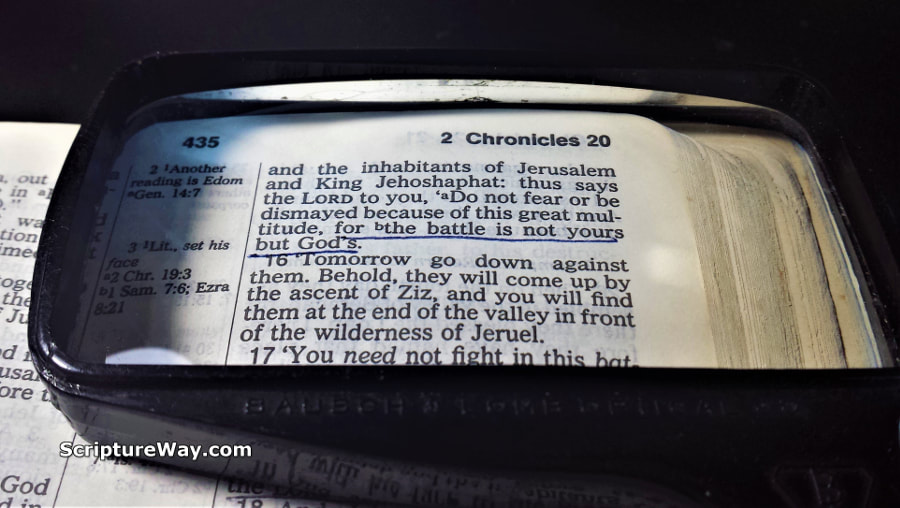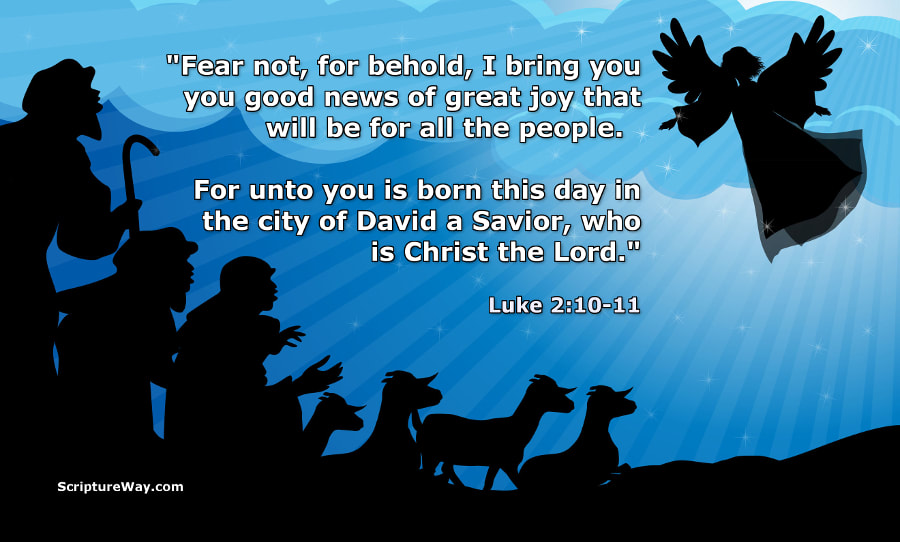"Don’t worry about anything; instead, pray about everything; tell God your needs, and don’t forget to thank him for his answers. (7) If you do this, you will experience God’s peace, which is far more wonderful than the human mind can understand. His peace will keep your thoughts and your hearts quiet and at rest as you trust in Christ Jesus."
(Philippians 4:6-7 The Living Bible)
This scripture is special to me. Philippians 4:6-7 is the first scripture passage I memorized after committing my life to the Lord in 1974. My thirst for the Word began then. My wife and I both memorized this scripture at the urging of our first Adult Bible Study teacher, "Bruce." Bruce continually quipped, "When in a fix, Philippians 4:6."
This article essentially is a reprint of an article I wrote in the 1982 time frame for our church newspaper, "The Good News."
Worry still is a major issue for people. In fact, worry is rampant. Worry is nearly universal in our American lifestyle; it certainly affects non-Christians, but it also affects Christians. Non-Christians do not have the resources to draw upon that we have -- namely, the Lord Jesus Christ Himself, His word, and the Christian support community. Oh how miserable it must be to live and not know Jesus Christ!
Pray about everything
First, Paul tells us we are to pray, and not only to pray, but to pray about everything, and that includes praying about everything that worries us. God is not too busy to hear our prayers -- He is always available. Too often we are too busy to avail ourselves of His time. Furthermore, our God is concerned about all of our life, down to the smallest detail. He wants us to cast all of our anxieties on Him, not just the emergencies (1 Peter 5:7 ESV).
Tell God our needs
Second, we are to tell God our needs. I find it interesting that although God knows everything about us, including our thoughts and concerns, Paul instructs us to tell God our needs. There are many fine ways to pray -- in church, in groups -- but I believe the key is to have a foundation of private and personal prayer with God on a frequent and regular basis. Prayer with the body of Christ is uplifting and necessary to our spiritual well-being, but there is no substitute for quality time spent alone with the Lord.
Thank Him for His answers
Third, we are to thank God for His answers. We are to pray with thanksgiving in our hearts. An attitude of thanklessness on our part -- for God's blessings and provisions for us and for His answers to our prayers -- is a major hindrance to an effectual prayer life and hampers the development of a close relationship with God. Each day as we pray it is helpful to recall the things we have previously prayed about, and to thank Him for His answers -- and for those answers which are still "on the way."
Experience God's peace
Fourth, God promises us peace -- a wonderful peace in our hearts. He promises that His peace will guard our hearts (Philippians 4:7 ESV). The Greek word for guard is phroureó, which means to be a watcher in advance, to mount guard as a sentinel, and to protect (Strong's Exhaustive Concordance, Ref. 1). God's peace guards our hearts and keeps our thoughts quiet.
This peace, God's peace in our hearts, is so precious that man's mind can never produce it -- it is given by God. And, the only way we can receive it is to trust in Christ Jesus. There is no other way to receive the "peace which surpasses understanding" (Philippians 4:7 ESV) than to trust personally in Jesus Christ. We do this by placing our complete reliance upon Him as a person and on His word -- we place the care of our whole being into His hands. With the world, there is worry. In contrast, as followers of Jesus Christ, we can pray about everything, tell God our needs, and thank Him for His answers. Then His peace will keep our thoughts and our hearts quiet and at rest as we trust in Christ Jesus (Philippians 4:6-7 TLB).
References
1. https://biblehub.com/greek/5432.htm 2. http://www.scriptureway.com/home/the-keys-to-effective-prayer
For Additional Reading
To read more on the topic of prayer, check the article, "The Keys to Effective Prayer" (Ref. 2).
1 Comment
"When I am afraid, I will put my trust in You. In God, whose word I praise, In God I have put my trust; I shall not be afraid. What can mere man do to me?" (Psalm 56:3-4)
"Trust and confidence in the Lord is the best antidote against fears" -- John Gill (1697-1771) (Ref. 1, Ref. 2).
Consider. On a scale from 1 to 10, with 10 being the highest, how would you rate yourself for trusting in God when you are afraid?
Biblical Background
David wrote Psalm 56 during one of the lowest points in his life. Saul, the king of Israel, was determined to kill David (1 Samuel 20:30-33). Even though Jonathan, Saul's son, and David were close friends, Jonathan advised David to flee from Saul (1 Samuel 20:41-42). David came to Nob to Ahimelech, the priest (1 Samuel 21:1). David lied to Ahimelech about the purpose of his visit (1 Samuel 21:2). David received from Ahimelech consecrated bread and the sword of Goliath (1 Samuel 21:6, 1 Samuel 21:9). David arose and "fled that day from Saul" to Achish king of Gath, a city in Philistine territory (1 Samuel 21:10, Ref. 3).
Gath was the home town of Goliath (1 Samuel 17:4). David had killed Goliath in battle (1 Samuel 17:41-49). David now had the sword of Goliath with him. The servants of Achish knew of David's reputation. "Is this not David the king of the land? Did they not sing of this one as they danced, saying, 'Saul has slain his thousands, And David his ten thousands'?" (1 Samuel 21:11). The scripture says "David took these words to heart and greatly feared Achish king of Gath" (1 Samuel 21:12). David then "disguised his sanity before them, and acted insanely" (1 Samuel 21:13). When I Am Afraid, I Will Put My Trust in You
Despite David's fear and troubled emotional state, David makes an astounding declaration about trusting in God when he was afraid. "When I am afraid, I will put my trust in You. In God, whose word I praise, In God I have put my trust; I shall not be afraid. What can mere man do to me?" (Psalm 56:3-4). David repeats his declaration of trust in Psalm 56:11, "In God I have put my trust, I shall not be afraid." Note the subtle change in tense from "I will put my trust" in verse 3 to "I have put my trust" in verse 11.
In the Hebrew, the word for "trust" means to be boldly confident, secure, and sure (Strong's Exhaustive Concordance - Ref. 4). When we trust in God, we are boldly confident, secure, and sure in him. David frequently wrote in the Psalms about trusting in God. For additional encouragement and strength on this topic, I suggest you read "29 Bible Verses About Trusting God" (Ref. 5). David recognized that the remedy -- the antidote -- for fear is to trust in God. David put his confidence in God and in God's care. Will you do the same? A related, closing verse for your consideration: "Do not fear, for I am with you; Do not be afraid, for I am your God. I will strengthen you, I will also help you, I will also uphold you with My righteous right hand." (Isaiah 41:10)
Apply. If you are fearful or afraid today, pray to God. Put your complete trust in God and the promises in his word (Psalm 56:3-4). God will strengthen you and help you (Isaiah 41:10). Thank God for his work in you to deliver you from your fear and for taking care of your concerns.
Suggested Listening. Listen to Alan Jackson's Official Music Video, "'Tis So Sweet to Trust in Jesus (Live)."
Related Lessons and Resources
"29 Bible Verses About Trusting God" - Psalm 56:3 "The Remedy for a Troubled Heart (John 14:1)" "'Fear Nots' of the Old Testament" - Isaiah 41:10
"Do not fear or be dismayed because of this great multitude, for the battle is not yours but God's." (2 Chronicles 20:15)
Purpose:
This article presents five steps to deal with our personal crises - steps that are scriptural, methodical, and effective. All of us at times either have faced or will face personal crises. Circumstances like this strike at the core of our being – physical, spiritual, and emotional. The Bible is a great comfort to us any time, but especially during difficult times - such as the times we are going through now. Step 1: Recall God's Promises
The first place to turn to is to the Bible. Get your attention off of your problem and on to God. Read and meditate upon God’s promises. This step has a vastly therapeutic effect.
"God is our refuge and strength, a very present help in trouble. 2 Therefore we will not fear though the earth gives way, though the mountains be moved into the heart of the sea, 3 though its waters roar and foam, though the mountains tremble at its swelling." (Psalm 46:1-3) For your encouragement, I have included links to 26 additional "promises passages" from God's word. You may see all of the verses listed below written out in just one click here (Ref. 1 - "Bible Verses for Times of Crisis"). God's promises verses: Deuteronomy 31:6; Joshua 1:9; Psalm 16:8; Psalm 23:1; Psalm 27:1; Psalm 34:4; Psalm 34:7; Psalm 55:22; Psalm 56:3-4; Psalm 68:19-20; Psalm 91:1-6; Psalm 103:1-5; Proverbs 3:5-6; Isaiah 26:3-4; Isaiah 40:31; Isaiah 41:10; Isaiah 43:2; Matthew 11:28; John 14:27; Romans 8:28; Romans 15:13; Philippians 4:6-7; Philippians 4:19; Hebrews 6:19; 1 Peter 5:6-7; Revelation 21:4. Read your Bible regularly, not just when you have a crisis. Memorize scripture verses. That way, when a crisis arises, you can immediately draw upon familiar, comforting words of scripture, and you will be well-equipped to deal with difficult situations when they occur (2 Timothy 3:16-17). Step 2: Trust in God Through Prayer
Prayer is an open conversation with God. Even a short prayer, "Help me," is long enough. Talk with God and ask him to take care of your problem. Trust God to act (Proverbs 3:5-6). Ask God to take care of your problem according to God's will, not your own (1 John 5:14-15). Trust that God is in control of the situation.
Step 3: Solicit Prayer Support from other Christians
Other Christians can bring you much encouragement by praying with you or for you. Share your need or concern with Christian friends, and ask for their prayers. When you are "down," others can pray from strength and lift you up. "Plug in" with one or more small groups of Christians, for example, a Bible study or prayer group, or a fellowship group. Small groups can provide you tremendous personal support (Matthew 18:19-20; Galatians 6:2; James 5:16).
Step 4: Believe that God Will Act
Keep the faith. Remember that you have prayed. Keep on praying. Don’t give up. Feed your faith, not your doubts. Whichever one you feed will grow (Luke 18:1-8; Mark 9:21-24; Psalm 37:5; Hebrews 11:1). God will do what he promises.
Step 5: Testify Publicly to the Results that God Provides
Tell others how God answers your prayers. By this, you will encourage other people. Jesus expects you to “go public” with your testimony about his work in your life – that God may be glorified (Matthew 10:32; Mark 5:18-20; Psalm 66:16, 1 Peter 3:15).
-------------------------------------
Praise God that God's word never passes away (Matthew 24:35)! We can always count on God to help us through difficult times. God's promises are true and everlasting.
"And the angel said to them, 'Fear not, for behold, I bring you good news of great joy that will be for all the people. For unto you is born this day in the city of David a Savior, who is Christ the Lord.'" (Luke 2:10-11)
This article is the third in a series on the "'Fear Nots' of the Bible" (Ref. 1, Ref. 2). This article presents the "Fear not" angelic encounters with Zacharias, Mary, and the shepherds in Luke chapters 1 and 2.
Consider. Do you regard the announcement of the birth of Jesus as good news? If so, are you telling others? Are you rejoicing because you know Jesus as your Savior?
Introduction
Angels are active in both the Old Testament and New Testament scriptures. Angels bring announcements and special messages of encouragement from God to specific people.
In the New Testament, the Greek word for angel is aggelos. Aggelos means a messenger or delegate, someone sent by God to proclaim His message (Ref. 3). Matthew chapter 1 describes the first appearance of an angel in the New Testament. An angel of the Lord appears to Joseph in a dream, saying, "Joseph, thou son of David, fear not to take unto thee Mary thy wife: for that which is conceived in her is of the Holy Spirit" (Matthew 1:20). Supernatural angelic appearances to humans in the scriptures often, but not always, begin with "Fear not," also translated as "Do not fear" or "Do not be afraid" (Ref. 1, Ref. 2). The Angel Gabriel Appears to Zacharias
Luke 1:5-25 tells us about the angel Gabriel's appearance to the priest Zacharias and the angel's message foretelling the birth of John the Baptist.
When Gabriel appears to Zacharias in the temple, Zacharias is troubled and fearful (Luke 1:12). In Luke 1:13 NKJV, the angel's message to Zacharias has four main points: 1) "Do not be afraid" ("Fear not" in the KJV), 2) "Your prayer is heard," 3) "Your wife Elizabeth will bear you a son" and 4) "You shall call his name John." Gabriel tells Zacharias that John will be great in the sight of the Lord (Luke 1:15), will be filled with the Holy Spirit (Luke 1:15), will turn back many children of Israel to the Lord (Luke 1:16), and will go before the Lord (Luke 1:17). The angel Gabriel tells Zacharias that this message is good news, also translated as glad tidings (Luke 1:19 NASB, Luke 1:19 NKJV). The Greek word for good news and glad tidings is euaggelizó (Ref. 4). We will see the same word again in Luke 2:10. Scripture tells us that Zacharias and Elizabeth were righteous and blameless in following the Lord's commandments (Luke 1:5-6). However, Zacharias does not believe (have faith in, trust in) the angel's "good news" message (Luke 1:20, Ref. 5). Disbelief in God's message has consequences. Zacharias is not able to speak until the prophecy is fulfilled when John is born (Luke 1:57, 63). When his mouth is opened, Zacharias speaks and praises God (Luke 1:64). The Angel Gabriel Appears to Mary
Gabriel greets Mary with the words, "Rejoice, highly favored one, the Lord is with you; blessed are you among women!" (Luke 1:28) The Greek word for favored is charitoó, which means highly-favored because receptive to God's grace (Ref. 7).
The Scripture says, "Mary was greatly troubled at his words and wondered what kind of greeting this might be" (Luke 1:29). Unlike Zacharias (Luke 1:12), Mary was not terrified by the angel's appearance or presence. However, she was perplexed by what the angel meant by his greeting. The angel responds and tells her, "Fear not, Mary: for thou hast favour with God"(Luke 1:30 KJV).
Gabriel then states the substance of his message to Mary. "And behold, you will conceive in your womb and bring forth a Son, and shall call His name Jesus. He will be great, and will be called the Son of the Highest; and the Lord God will give Him the throne of His father David. And He will reign over the house of Jacob forever, and of His kingdom there will be no end" (Luke 1:31-33). Then Mary asks Gabriel a very interesting question - "How can this be, since I do not know a man?" (Luke 1:34) The Greek word for know in this verse is ginóskó, which means know through personal experience and in this context refers to sexual intimacy (Ref. 8). Mary did not doubt the angel's word. From her humility and modesty she wondered how her pregnancy could be effected in her virgin state (Ref. 9). The angel Gabriel replies and says, "The Holy Spirit will come upon you, and the power of the Highest will overshadow you; therefore, also, that Holy One who is to be born will be called the Son of God" (Luke 1:35). Gabriel also says, "For with God nothing will be impossible" (Luke 1:37). Mary then humbly speaks her assent and consent to the will of God. "Behold the maidservant of the Lord! Let it be to me according to your word" (Luke 1:38). The Greek word for Let it be is ginomai, which means come into being, happen, and become (Ref. 10). The angel then departs, having accomplished what he came for (Luke 1:38). The Angel Announces the Savior's Birth to the Shepherds “Fear not, for behold, I bring you good news of great joy that will be for all the people” (Luke 2:10) - LUMO Project - Used by Permission “Fear not, for behold, I bring you good news of great joy that will be for all the people” (Luke 2:10) - LUMO Project - Used by Permission
In Luke 2:8-14 the gospel writer describes the glorious announcement of the birth of the Savior. Previously, Luke had described the Angel Gabriel's message to Mary about the conception of Jesus, the Son of God (Luke 1:26-38). In the verses immediately before the angel's announcement to the shepherds (Luke 2:1-7), the gospel account informs us that Joseph and Mary had traveled from Nazareth to Bethlehem, and that her Son now was born.
The Scripture tells us that an angel (name not identified) suddenly stands before shepherds who were outside Bethlehem at night (Luke 2:8-9). The scripture states "And the glory of the Lord shone around them" (Luke 2:9, italics added). The brilliant glory of the Lord around the shepherds during the angel's announcement is unique compared to the appearance of Gabriel to Zacharias in Luke 1:8-25 and to Mary in Luke 1:26-38. The Apostle Paul reports a similar encounter with bright light around himself and his traveling companions on the way to Damascus (Acts 26:13).
The shepherds "feared with a great fear" at the angel's sudden appearance (Luke 2:9 DRA). The King James Version famously says "they were sore afraid" (Luke 2:9 KJV).
The angel tells the shepherds, "Fear not" (Luke 2:10). Yes, the appearance of the angel was supernatural; however, the angel's message about the birth of Christ is good news, not bad news. "For behold, I bring you good news of great joy that will be for all the people. For unto you is born this day in the city of David a Savior, who is Christ the Lord" (Luke 2:10-11). The Greek verb for bring good news is euaggelizó which also is translated as bring good tidings (Ref. 4).
The Greek word for Savior in Luke 2:11 is sótér, which means savior, deliverer, preserver (Strong's Concordance, Ref. 11). Jesus Christ is our Savior because he "saves believers from their sins and delivers them into His safety" (HELPS Word-studies, Ref. 11, 1 John 4:14, 1 Timothy 1:15, Luke 19:10).
The shepherds considered the angel's message, and then they went with haste, without delay to see the Savior themselves (Luke 2:15-16). After they had seen Jesus, they told others the good news about Jesus (Luke 2:17). Then the shepherds returned, "glorifying and praising God for all they had heard and seen" (Luke 2:20).
Apply. Like the shepherds, have you accepted the good news of the Savior for yourself? If not, then believe that he is the Son of God as described in the scriptures, and ask him to forgive your sins. Then go on your way rejoicing and tell others the good news about Jesus.
References
1. http://www.scriptureway.com/home/fear-nots-of-the-old-testament 2. http://www.scriptureway.com/home/fear-nots-of-jesus 3. https://biblehub.com/greek/32.htm 4. https://biblehub.com/greek/2097.htm 5. https://biblehub.com/greek/4100.htm 6. https://biblehub.com/greek/3933.htm 7. https://biblehub.com/greek/5487.htm 8. https://biblehub.com/greek/1097.htm 9. https://biblehub.com/commentaries/benson/luke/1.htm 10. https://biblehub.com/greek/1096.htm 11. https://biblehub.com/greek/4990.htm
"Fear not, for I am with you; Be not dismayed, for I am your God. I will strengthen you, Yes, I will help you, I will uphold you with My righteous right hand." (Isaiah 41:10)
This article is the first in a series on the "'Fear Nots' of the Bible." This article presents God's divinely encouraging "Fear not" and "Do not be afraid" statements from the Old Testament.
Consider. In our troubles and challenges of life, God comes to us and says, "Fear not," and "Do not be afraid." In addition to telling us, "Do not be afraid," God encourages us because God is with us and blesses us in a variety of ways.
God is Our Shield
Genesis 15:1 - "After these things the word of the Lord came to Abram in a vision, saying, 'Do not be afraid, Abram. I am your shield, your exceedingly great reward.'" God is our protector and defense.
God Blesses His People
Genesis 26:24 - "And the Lord appeared to him* the same night and said, 'I am the God of your father Abraham; do not fear, for I am with you. I will bless you and multiply your descendants for My servant Abraham’s sake.'"
* Isaac, Abraham's son The Merriam-Webster Dictionary defines bless as invoke divine care, confer prosperity, protect, and endow with favor (Ref. 1). God Saves His People
When the Egyptian army was about to overtake the Israelites, and immediately before God divided the sea, Moses said to the Israelites, "Do not be afraid. Stand still, and see the salvation of the Lord, which He will accomplish for you today..." (Exodus 14:13).
When the Moabites and Ammonites came to make war against Jehoshaphat, the Spirit of the Lord came upon Jahaziel and he spoke to the Israelites (2 Chronicles 20:14). "You will not need to fight in this battle. Position yourselves, stand still and see the salvation of the Lord, who is with you, O Judah and Jerusalem! Do not fear or be dismayed; tomorrow go out against them, for the Lord is with you" (2 Chronicles 20:17). The Hebrew word for salvation in Exodus 14:13 and 2 Chronicles 20:17 is yeshuah, pronounced yesh-oo'-aw (Ref. 2). Yeshua also is the modern Hebrew name for Jesus of Nazareth (Ref. 3). In English, the name Yeshua is extensively used by followers of Messianic Judaism (Ref. 3). God Goes with His Servants into Battle
Deuteronomy 20:2-4 - "So it shall be, when you are on the verge of battle, that the priest shall approach and speak to the people. And he shall say to them, 'Hear, O Israel: Today you are on the verge of battle with your enemies. Do not let your heart faint, do not be afraid, and do not tremble or be terrified because of them; for the Lord your God is He who goes with you, to fight for you against your enemies, to save you.'"
God Never Fails or Forsakes His People Moses Says to Joshua, "The Lord is the one who goes ahead of you; He will be with you. He will not fail you or forsake you. Do not fear or be dismayed" (Deuteronomy 31:8). Moody Publishers / FreeBibleimages.org. Moses Says to Joshua, "The Lord is the one who goes ahead of you; He will be with you. He will not fail you or forsake you. Do not fear or be dismayed" (Deuteronomy 31:8). Moody Publishers / FreeBibleimages.org.
In Moses' last counsel to all the Israelite people, Moses said, "Be strong and courageous, do not be afraid or tremble at them, for the Lord your God is the one who goes with you. He will not fail you or forsake you" (Deuteronomy 31:1, 6).
Moses then said to his successor, Joshua, "The Lord is the one who goes ahead of you; He will be with you. He will not fail you or forsake you. Do not fear or be dismayed" (Deuteronomy 31:8). God Strengthens Us, Helps Us, and Supports Us
Isaiah 41:10 - "Fear not, for I am with you; Be not dismayed, for I am your God. I will strengthen you, Yes, I will help you, I will uphold you with My righteous right hand."
God is Our Companion in Trials
Isaiah 43:1-2 - "Fear not, for I have redeemed you; I have called you by your name; You are Mine. When you pass through the waters, I will be with you; And through the rivers, they shall not overflow you. When you walk through the fire, you shall not be burned, Nor shall the flame scorch you."
God indeed has redeemed his people. The Hebrew word for redeem is gaal, which means to act as a kinsman and to buy back a relative's property (Ref. 4). God has already demonstrated that his promises in Isaiah 43:1-2 are true. God parted the sea for the Israelites to pass through on dry land (Exodus 14:15-16). God caused the Jordan River to rise up in a heap so it would not overflow the Israelites when they crossed on dry ground (Joshua 3:13-17). Recall that King Nebuchadnezzar had Shadrach, Meshach, and Abed-Nego cast into the blazing furnace of fire because they would not serve Nebuchadnezzar's gods (Daniel 3:16-20). Scripture tells us that King Nebuchadnezzar saw in the fire a divine companion that God provided to be with Shadrach, Meshach, and Abed-Nego during their trial. "'Look!' he answered, 'I see four men loose, walking in the midst of the fire; and they are not hurt, and the form of the fourth is like the Son of God'" (Daniel 3:25).
Apply. How do you need God's encouragement today to "Fear not" or "Do not be afraid"? Claim God's promises to be present with you, to bless you, to strengthen you, and to give you courage.
Consider. On the evening before his death, Jesus spoke with his disciples. Jesus told his disciples that he was about to leave them (John 13:33). Naturally, their hearts filled with sorrow (John 16:5-6). Jesus had already told his listeners who he is. "I and the Father are one" (John 10:30). "Truly, truly, I say to you, before Abraham was born, I am" (John 8:58, Exodus 3:6, Exodus 3:14). As the remedy for their troubled hearts, Jesus asked his disciples to believe in him. The Greek word for "believe" is pisteuó, which means have faith in, trust in (Ref. 1). As the remedy for our troubled hearts, Jesus asks us to believe in him. Jesus asks us to trust him and to have faith in him. The remedy for a troubled heart is to believe in Jesus. To the father of the boy who was deaf, mute, and had seizures, Jesus said, "All things are possible for the one who believes and trusts [in Me]!" (verse 23 in Mark 9:14-29) To the woman who touched Jesus' cloak and was healed, Jesus said, "Daughter, your faith [your personal trust and confidence in Me] has restored you to health; go in peace and be [permanently] healed from your suffering" (Mark 5:34). To his disciples, Jesus said, "Peace I leave with you; My [perfect] peace I give to you; not as the world gives do I give to you. Do not let your heart be troubled, nor let it be afraid. [Let My perfect peace calm you in every circumstance and give you courage and strength for every challenge.]" (John 14:27). Apply. Is something troubling your heart today? Will you choose to believe in Jesus? Listen. I encourage you to listen to Louis Armstrong's recording of the African-American spiritual song, "Nobody Knows the Trouble I've Seen." To learn more about these topics, please go to the About the Way page:
|
Daily Bible Verse(Click the link above) AuthorMr. Whitney V. Myers. Christian. For more information, please visit the Author Page. Posting ScheduleI plan to provide new postings about once a month. Planned Topics(subject to change) Recent Posts(most recent three months) Popular Posts(top 10) Categories
All
Archives
July 2024
|
|
Copyright 2018-2024 Whitney V. Myers |
Listed in Feedspot's Top 100 Bible Study Blogs and Websites |







 RSS Feed
RSS Feed
